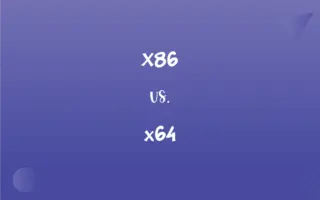Varchar vs. Nvarchar: What's the Difference?
Edited by Aimie Carlson || By Harlon Moss || Updated on October 8, 2023
Varchar stores variable-length character data, 1 byte/char; Nvarchar stores Unicode text, 2 bytes/char, suitable for multilingual content.

Key Differences
Varchar is for non-Unicode text, efficient for English, 1 byte/char. Ideal for compact storage of English-centric data like names. Nvarchar handles Unicode, 2 bytes/char, accommodating various languages. Ensures compatibility with diverse character sets.
Limited support for non-English characters, may not handle all languages effectively. Designed for multilingual data, perfect for international databases, supports all characters universally.
Suitable for databases with predominantly English content, efficient use of storage. Essential for applications involving multiple languages or special characters like emojis, but consumes more storage space.
Common choice for URLs, emails, and short text fields in English. Vital for applications dealing with internationalization and user-generated content, ensuring seamless language support.
Efficient in terms of storage and performance for English-based systems. Offers flexibility and language inclusivity but may require more resources due to larger storage needs.
ADVERTISEMENT
Comparison Chart
Storage Size
1 byte per character
2 bytes per character
Suitable for
Non-Unicode character sets
Unicode character sets
Space Efficiency
Less efficient for Unicode
More storage for Unicode
Language Compatibility
Limited to some languages
Supports multiple languages
Varchar and Nvarchar Definitions
Varchar
Stores text using 1 byte per character.
Varchar(255) can hold a description like Product details.
ADVERTISEMENT
Nvarchar
Uses 2 bytes per character for storage.
Nvarchar(100) accommodates diverse character sets.
Varchar
Ideal for English-centric databases.
Varchar(30) can contain email addresses like example@email.com.
Nvarchar
Ensures compatibility with various languages.
Nvarchar fields can handle multilingual content seamlessly.
Varchar
Often used for storing short strings like keywords.
Varchar(20) holds search terms such as database query.
Nvarchar
Unicode character data type.
An nvarchar field can store names like José and 한국어.
Varchar
Variable-length character data type.
A varchar column stores names like John and Alice.
Nvarchar
Suitable for databases with international data.
Nvarchar(50) stores customer names in different scripts.
Varchar
Supports efficient storage of English characters.
A varchar field stores addresses like 123 Main St.
Nvarchar
Enables storage of special characters like emojis.
Nvarchar(30) can hold text with emojis, such as 🙂🌟
Varchar
A text field of indeterminate length in a database, as opposed to the traditional fixed-length field.
FAQs
What is the storage size of a varchar column for ASCII characters?
It uses 1 byte per ASCII character.
Is varchar suitable for storing non-English characters?
Yes, varchar is suitable for non-English characters but may not support all Unicode characters.
Do both varchar and nvarchar support collations for sorting and comparing data?
Yes, both data types support collations to control how data is sorted and compared.
What is varchar in a database?
Varchar is a data type used to store variable-length character data in a database.
What is the storage size of an nvarchar column for Unicode characters?
It uses 2 bytes per Unicode character.
When should I use varchar?
Use varchar when dealing with English-centric data or when storage efficiency is critical.
Which one consumes more storage space, varchar, or nvarchar?
Nvarchar consumes more storage space due to its use of 2 bytes per character.
Is sorting and searching different for varchar and nvarchar?
Sorting and searching can be slower for nvarchar due to the increased storage size.
Which data type is more suitable for storing names in a database?
Varchar is often used for names, but nvarchar is better for international names.
What is the maximum length of varchar?
The maximum length varies by database system, but it's usually around 255 characters.
Can I mix varchar and nvarchar columns in the same database table?
Yes, you can mix them, but it's essential to consider character set compatibility.
When should I use nvarchar?
Use nvarchar when working with multilingual data or when compatibility with diverse character sets is essential.
Do both varchar and nvarchar support special characters like emojis?
Nvarchar is better suited for special characters and emojis due to its Unicode support.
What is the maximum length of nvarchar?
Like varchar, the maximum length varies by database system, often around 255 characters.
Is nvarchar suitable for storing non-English characters?
Yes, nvarchar is designed to support characters from various languages.
Can I convert varchar to nvarchar and vice versa?
Yes, you can convert between them, but data may be truncated if going from nvarchar to varchar.
Are there performance differences between varchar and nvarchar?
Nvarchar may have slightly slower performance due to the larger storage size.
Are there any limitations on using varchar or nvarchar in database queries?
Queries involving nvarchar may require more memory and processing power.
Can I change the length of a varchar or nvarchar column after creating it?
Yes, you can typically alter the length of these columns in most database systems.
What is nvarchar in a database?
Nvarchar is a data type used to store Unicode character data, making it suitable for multiple languages.
About Author
Written by
Harlon MossHarlon is a seasoned quality moderator and accomplished content writer for Difference Wiki. An alumnus of the prestigious University of California, he earned his degree in Computer Science. Leveraging his academic background, Harlon brings a meticulous and informed perspective to his work, ensuring content accuracy and excellence.
Edited by
Aimie CarlsonAimie Carlson, holding a master's degree in English literature, is a fervent English language enthusiast. She lends her writing talents to Difference Wiki, a prominent website that specializes in comparisons, offering readers insightful analyses that both captivate and inform.































































